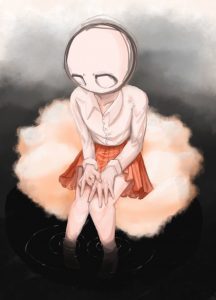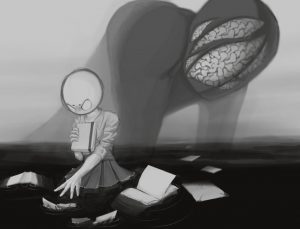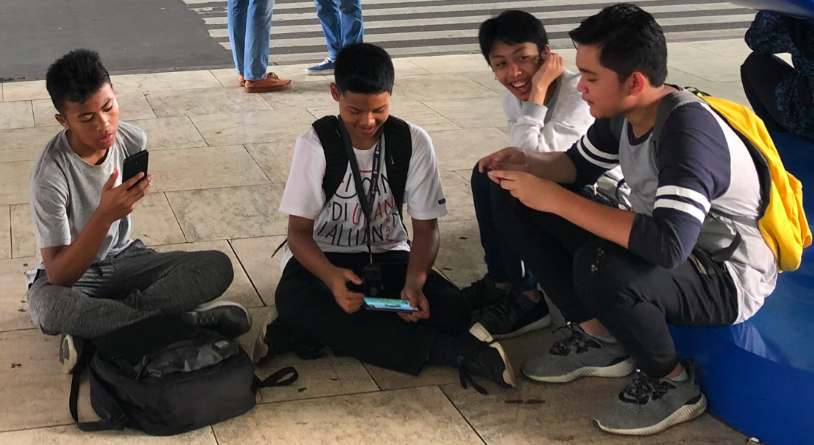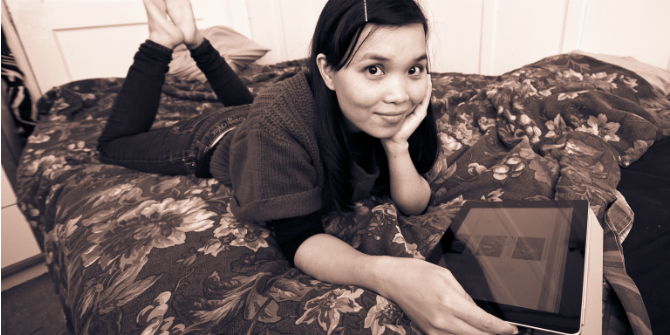 While there is a long tradition of using digital ethnography to observe and understand youth spaces and cultures, the Covid-19 pandemic created a unique set of conditions for research with children and young people online. For parening.digital, Laurie Day discusses the Growing-Up Under Covid-19 transnational participatory action research project with young researchers Phoebe Hanson, Anoushka Prasanna Rao, and Henrietta Tjan. Rather than providing a temporary fix during Covid restrictions, the authors argue that digitally-mediated PAR has untapped potential to connect global researchers and young people, and to democratise social research practices.
While there is a long tradition of using digital ethnography to observe and understand youth spaces and cultures, the Covid-19 pandemic created a unique set of conditions for research with children and young people online. For parening.digital, Laurie Day discusses the Growing-Up Under Covid-19 transnational participatory action research project with young researchers Phoebe Hanson, Anoushka Prasanna Rao, and Henrietta Tjan. Rather than providing a temporary fix during Covid restrictions, the authors argue that digitally-mediated PAR has untapped potential to connect global researchers and young people, and to democratise social research practices.
The Covid-19 paradigm shift
With the onset of the Covid-19 crisis, young people found themselves caught in a paradox. On the one hand, youth were the comparatively ‘safe’ population in terms of public health risk. On the other, government decisions regarding the management of the crisis stood to have profound implications for their lives. While this situation was unique, it also brought into focus a longstanding problem of young people’s under-representation in democratic life. From school closures to exams and social distancing, young voices were notably absent from key decisions during the crisis.
The convergence of a public health crisis and a crisis of participation presented challenges and opportunities to the research community. This period saw a visible gear shift in the use of deliberative and participatory research methods and adaptive uses of digital tools in response to the social restrictions posed by Covid-19. It produced likeminded projects bringing adult researchers and young people together, with a shared aim of amplifying ‘less heard’ voices and experiences.
One of these projects, Growing-up under Covid-19, was launched in April 2020 with a grant from the Nuffield Foundation. Over 18 months, adult researchers from Ecorys and the University of Huddersfield engaged and supported 70 young people aged 14-18 from the UK, Italy, Lebanon and Singapore to carry out research documenting their lived experiences of the pandemic through participatory action research. Carried out entirely online, young people worked individually, within virtual country teams, and as part of a wider transnational network to co-produce a final report and recommendations for Covid recovery.
The project posed many questions – about the legitimacy of doing research online, of the ethical dilemmas this presents, and the possibility of meaningful engagement working remotely across countries. Here, we give some reflections on what we learned.
Social technology
Laurie: what felt quite different to a conventional research project was that everything took place online in collaborative spaces. How did you find working in this way, and what were the benefits and drawbacks?
Phoebe: Digital communication was unique in that it allowed us to connect across different countries, which was transformative for the scope of the research but also for us as individuals, being able to participate in a kind of cultural exchange without the associated costs. Working virtually allowed us, as mostly full-time students, to manage the commitment of this project alongside part-time employment and our studies, as there was no commute time, and we could work from anywhere.
In terms of drawbacks, of course, conducting research that focused on individuals’ stories and experiences was difficult to do well while working online. I chose to speak to children about their experiences of schooling, so establishing a trusting relationship was difficult, but it wasn’t impossible.
Henrietta: This research method allowed us to connect across transnational borders, regardless of time zones, by utilising platforms such as Yammer to exchange ideas. This was really exciting as we were able to hear from different perspectives, especially since all of us come from all over the world. I personally benefited from the flexibility of the project, being able to share my findings in my own time made the project much more enjoyable and meaningful. But this does come with some drawbacks, one being the lack of face-to-face communication.
Double-digital
 Laurie: The research was carried out in real time, so it captured the changes that were happening to culture and society when the world, as well as the project, had gone digital. What were the main themes or findings that stand out for you?
Laurie: The research was carried out in real time, so it captured the changes that were happening to culture and society when the world, as well as the project, had gone digital. What were the main themes or findings that stand out for you?
Anoushka: I can think of a word that best represents what I researched individually, which is ‘resurgence’. I was reading a lot more about old problems that were popping up again – things like authoritarianism, violence against women, children and LGBTQIA+ people, and movements like Black Lives Matter were strengthened because more attention was drawn to police brutality and the ill-treatment of the Black community around the world. It very much felt like a lot of what was bubbling under the surface came to a head, and coupled with the Covid-19 crisis in many countries, it definitely felt close to chaotic at times. That being said, I think this has been needed for a long time, and it’s unfortunate that governments have not dealt with these issues as comprehensively and swiftly as was needed.
Phoebe: Resilience. During the pandemic we didn’t just face a public health crisis but cultural crisis after cultural crisis, either in violence against women, the Black community, the Asian community, or in the climate emergency. My news app has become near-dystopian. What stands out to me, particularly when it comes to children and young people, is how we have learned to be resilient, to exist and grow in the age of crisis. It’s a collective experience that’s often awful to watch, but that doesn’t stop the pride I feel when I work in schools and see children continuing to learn and play and laugh together while the world feels so heavy.
Constellations of research interests
Laurie: it was clear that individual young people were passionate about specific topics or causes, but we also tried to bring everyone’s research together into a final report. How well do you think the project was able to do that?
Anoushka: I found this freedom pretty interesting, because it very much treated all of our interests, be it niche or mainstream, equally. And there wasn’t any judgement in what we felt we wanted to research, so that felt freeing and empowering in a lot of ways. I also think that because of the diversity of the report, it allowed me to write about topics considered controversial in my country (Singapore), like LGBTQIA+ rights. This ‘constellation’ as we call it, also enabled a lot of co-authoring and working together, which was good because it helped us make new friends from different countries, and truly work together across borders to discuss issues we were passionate about that Covid-19 affected.
Henrietta: The final report encompassed all our research and views over the past two years. I think it really made our voices feel heard, as it heavily emphasised our inputs. Like what Anoushka mentioned, gathering perspectives from different countries encouraged us to think about others’ experiences during the crisis.
Final reflections
Crises can challenge the status quo in both positive and negative ways. The GUC19 project was borne out of a global pandemic and a need to adapt research to shift online, but offers learning beyond this context.
- A stronger focus on lived experience is much needed in youth research, to rebalance the narrative, and to value young people’s agency and insights.
- Where approached as a collaboration, participatory action research can reframe the inquiry in new and unexpected ways, challenging adult preconceptions of what young people need.
- Participatory action research can thrive in digital spaces, connecting young people and adults as co-researchers and opening the door to transnational collaboration. Beyond the Covid-19 restrictions, there are exciting possibilities for hybrid research.
- The ethical justification for participatory methods is clear. Participatory action research is a lens for researching youth citizenship and an expression of citizenship in its own right through ‘leaming-in-action’ with adults. With crises of democracy on so many fronts, young people’s democratic engagement in social research and in translating research into action is needed now more than ever.
Image credit: Artwork by Ellie Knox, one of the young researchers from the GUC19 project.
First published at www.parenting.digital, this post represents the views of the authors and not the position of the Parenting for a Digital Future blog, nor of the London School of Economics and Political Science.
You are free to republish the text of this article under Creative Commons licence crediting www.parenting.digital and the author of the piece. Please note that images are not included in this blanket licence.





